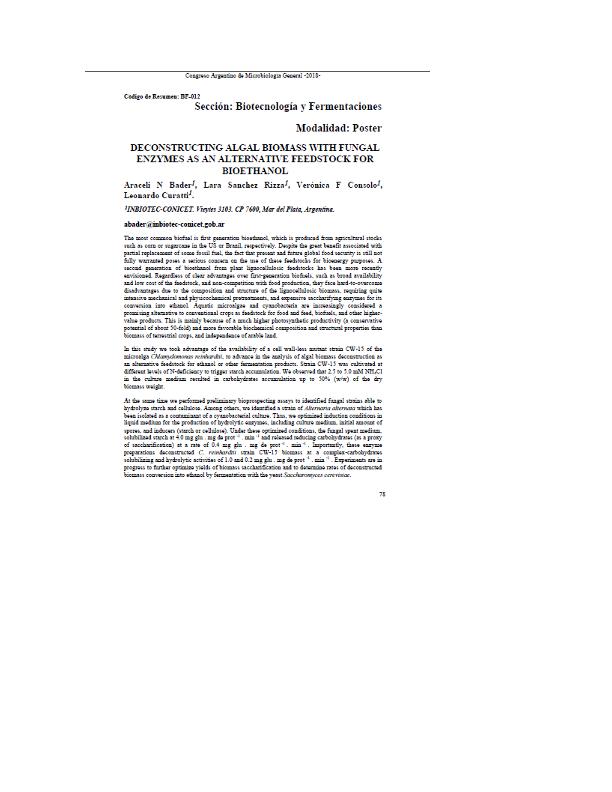Evento
Deconstructing algal biomass with fungal enzymes as an alternative feedstock for bioethanol
Tipo del evento:
Congreso
Nombre del evento:
XIII Congreso Argentino de microbiologia general
Fecha del evento:
08/2018
Institución Organizadora:
Sociedad Argentina de Microbiología General;
Título del Libro:
XVIII Congreso de la Sociedad Argentina de Microbiología General
Editorial:
Sociedad Argentina de Microbiología General
ISBN:
978-987-46701-5-1
Idioma:
Inglés
Clasificación temática:
Resumen
The most common biofuel is first generation bioethanol, which is produced from agricultural stocks such as corn or sugarcane in the US or Brazil, respectively. Despite the great benefit associated with partial replacement of some fossil fuel, the fact that present and future global food security is still not fully warranted poses a serious concern on the use of these feedstocks for bioenergy purposes. A second generation of bioethanol from plant lignocellulosic feedstocks has been more recently envisioned. Regardless of clear advantages over first-generation biofuels, such as broad availability and low cost of the feedstock, and non-competition with food production, they face hard-to-overcome disadvantages due to the composition and structure of the lignocellulosic biomass, requiring quite intensive mechanical and physicochemical pretreatments, and expensive saccharifying enzymes for its conversion into ethanol. Aquatic microalgae and cyanobacteria are increasingly considered a promising alternative to conventional crops as feedstock for food and feed, biofuels, and other higher-value products. This is mainly because of a much higher photosynthetic productivity (a conservative potential of about 50-fold) and more favorable biochemical composition and structural properties than biomass of terrestrial crops, and independence of arable land.In this study we took advantage of the availability of a cell wall-less mutant strain CW-15 of the microalga Chlamydomonas reinhardtii, to advance in the analysis of algal biomass deconstruction as an alternative feedstock for ethanol or other fermentation products. Strain CW-15 was cultivated at different levels of N-deficiency to trigger starch accumulation. We observed that 2.5 to 5.0 mM NH4Cl in the culture medium resulted in carbohydrates accumulation up to 50% (w/w) of the dry biomass weight.At the same time we performed preliminary bioprospecting assays to identified fungal strains able to hydrolyze starch and cellulose. Among others, we identified a strain of Alternaria alternata which has been isolated as a contaminant of a cyanobacterial culture. Thus, we optimized induction conditions in liquid medium for the production of hydrolytic enzymes, including culture medium, initial amount of spores, and inducers (starch or cellulose). Under these optimized conditions, the fungal spent medium, solubilized starch at 4.0 mg glu . mg de prot -1 . min -1 and released reducing carbohydrates (as a proxy of saccharification) at a rate of 0.4 mg glu . mg de prot -1 . min -1 . Importantly, these enzyme preparations deconstructed C. reinhardtii strain CW-15 biomass at a complex-carbohydrates solubilizing and hydrolytic activities of 1.0 and 0.2 mg glu . mg de prot -1 . min -1 . Experiments are in progress to further optimize yields of biomass saccharification and to determine rates of deconstructed biomass conversion into ethanol by fermentation with the yeast Saccharomyces cerevisiae.
Palabras clave:
bioethanol
,
hidrolytic fungus
,
fermentation
Archivos asociados
Licencia
Identificadores
Colecciones
Eventos(INBIOTEC)
Eventos de INSTITUTO DE INV. EN BIODIVERSIDAD Y BIOTECNOLOGIA
Eventos de INSTITUTO DE INV. EN BIODIVERSIDAD Y BIOTECNOLOGIA
Citación
Deconstructing algal biomass with fungal enzymes as an alternative feedstock for bioethanol; XIII Congreso Argentino de microbiologia general; San Luis; Argentina; 2018
Compartir




